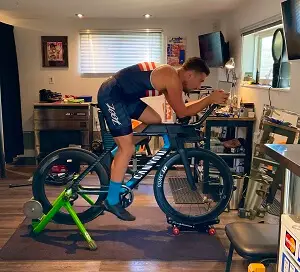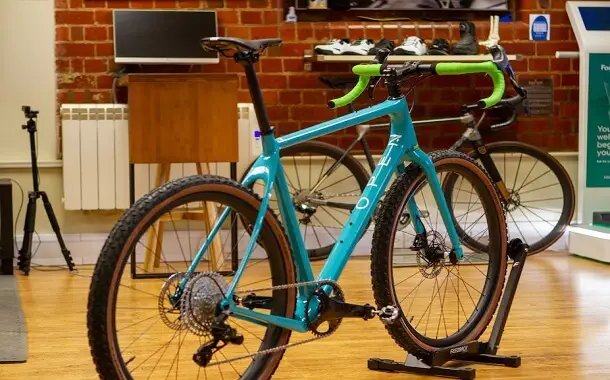How Much Does a Bike Fit Cost?
Last Updated on January 18, 2024
Written by CPA Alec Pow | Content Reviewed by ![]() CFA Alexander Popinker
CFA Alexander Popinker
Getting properly fitted to your bicycle is one of the most important investments any cycling enthusiast can make. A customized bike fit tailored to your individual body geometry and riding style can pay dividends through increased comfort, efficiency, and injury prevention over years of riding.
However, bike fitting is a specialized service requiring expertise, diagnostic tools, and a scientific process to analyze and adjust your position and component setup. This level of care and customization does not come cheap. So, what exactly can you expect to budget for a quality bike fit?
The range of bike fitting prices reflects the comprehensive process and technology involved in a quality fit session. Various factors like fit type, fitter experience, location, and inclusion of follow-up fine tuning impact the overall investment.
How Much Does a Bike Fit Cost?
The cost of a bike fit is anywhere from $75 for a basic fit to $500+ for advanced professional fits, depending on the features and technology included.
To provide a rough idea of typical costs, bike fitting services tend to range from:
- Basic Bike Fit costs between $75 – $150 – For simple measurement-based adjustments of saddle height, handlebar position, and cleat angle alone. Does not utilize advanced technology or diagnostics.
- Intermediate Fit costs between $150 – $300 – Thorough fit adjusting the saddle, handlebars, pedals/cleats, and other touchpoints based on manual analysis, measurements, and observation.
- Advanced Fit costs between $300 – $500 – Utilizes 3D motion capture, pressure mapping, and other technologies to analyze pedaling biomechanics, and muscle activation, and precisely identify positioning adjustments needed. Also includes extensive component recommendations.
- Pro Fit costs $500+ – Cutting-edge tools and diagnostics used by elite expert fitters to analyze joint angles, power output, aerodynamics, and minute fit details. Extensive equipment recommendations and customization. Generally reserved for competitive cyclists and professionals.
As with any service, expect to pay 20-50% more for high-end shops located in major metropolitan cities compared to more affordable suburban and rural locations. Travel fees for mobile fitters may also apply.
According to The Pro’s Closet, the cost of a professional bike fit can range from $300 to $500 depending on the fitter and any additional components, such as saddles.
Some Reddit users reported prices for bike fitting services include $75 for a basic fit, free with a new bike; $150 for an advanced road fit; $250 for a high-definition fit. Prices paid by individuals range from $80 to $200, with some reporting promotional rates or fees being waived with a bike purchase.
Shama Cycles offers a Retul bike fit for $250, which includes using the Retul 3D Motion Capture System.
Handlebar Cyclery offers various fit packages, such as a road/gravel bike fit for $175, a tri bike fit for $250, and a flatbar bike fit for $150.
What Does a Bike Fitting Service Include?
A bike fit is much more than just adjusting a seat height. Comprehensive fittings take a detailed, scientific approach to optimizing rider positioning and comfort.
Here are some key elements included:
Physical Assessment
- Interview about riding background, goals, and current fit issues
- Flexibility and range of motion evaluation
- Precise measurements of critical dimensions like inseam, torso, arm/leg lengths
Bike Setup Analysis
- Observation and adjustment of saddle height, fore/aft, handlebar position, and cleat angles
- Checking bike component sizes like stem, crank arm length, handlebar width etc.
- Analysis of factors like saddle comfort, knee tracking, and foot arch support
Recommendations
- Suggested customizations to contact points like saddle, handlebars, and pedals
- Proposed bike geometry changes like stem length, seatpost offset, etc.
- Ideal frame size, tube angles, and component groupset specs
Testing & Refinement
- Test rides to validate changes and any need for further refinements
- Additional adjustments in an iterative process until optimal position is achieved
Follow Up
- Re-fit appointments to tweak the position as flexibility improves over time
- Assistance dialing in new bikes or components as equipment evolves
The best fitters utilize a blend of manual analysis and advanced technology like motion capture, pressure mapping sensors, and 3D motion analysis software to gain comprehensive insights into achieving your ideal fit.
What Factors Influence Bike Fit Prices?
 There are a number of variables that impact how much you will pay for bike fitting expertise. These include:
There are a number of variables that impact how much you will pay for bike fitting expertise. These include:
Basic Fit vs. Advanced Fit – Simple fits may just adjust saddle height and handlebars while advanced fits involve detailed 3D motion analysis and pressure mapping. Advanced technology, tools, and diagnostics cost more.
Fitter’s Experience & Certifications – Elite fitters with significant experience fitting professional athletes or certifications in bike fitting, sports science, biomechanics, and related fields command premium pricing. Their expertise costs more.
Location – Urban vs. Rural – Shops located in major metropolitan cities have higher rent and labor costs so they charge higher rates for services than rural locations.
Included Components & Customization – Some shops include parts like new stems and handlebars with installation while others only provide recommendations. Included customization and labor increases cost.
Follow-Up Re-Fitting – Quality fitters often include 1-2 follow-up appointments to re-assess fit as your body adapts. Others charge for each visit, increasing long-term costs.
You might also like our articles on the cost of a bike tuneup, dirt bike, or Cyclebar classes.
Specialty Discipline Experience – Fitters with niche expertise in bike disciplines like road racing, time trials, triathlon, etc. often charge more for their specialized knowledge.
Travel Fees – Mobile bike fitters billing for travel time, mileage, and lodging expenses to reach remote clients will pass those costs along through higher rates.
The Benefits of Professional Bike Fit
Beyond the costs, a proper bike fit provides real value through:
- Increased Comfort – Reduced knee pain, hand numbness, neck strain, saddle issues, hot spots, and other fit-related pains.
- Improved Performance – Optimized aerodynamics, pedaling efficiency, and power transfer through tailored positioning.
- Injury Prevention – Reduced risk of chronic repetitive strain injuries through proper joint alignment and support.
- Customization – Personalized setup and component recommendations tailored to your unique biomechanics and cycling goals.
- Long Term Savings – Avoid spending on parts trying to alleviate fit issues without professional guidance.
For many passionate cyclists, a quality bike fit is well worth the price once they experience the benefits first hand. The investment upfront saves money over time.
Choosing a Reputable Bike Fitting Service
With bike fitting prices spanning a broad range from basic to advanced, it is essential to thoroughly vet potential fitters on several criteria before selecting a service provider:
Seeks Specialized Fitters, Not Just Mechanics – Anyone can claim bike fitting expertise. Seek specialists certified through respected organizations like Retul, Serotta, Bike Fit Pro, or similar.
Verify Relevant Certifications & Education – Look for certifications and training in bike fitting, exercise science, sports biomechanics, physical therapy, and related fields demonstrating advanced expertise.
Review Client Testimonials & References – Reputable fitters should provide client referrals and testimonials validating their experience and results delivering great fit experiences.
Ask About Their Fitting Process – They should utilize a blend of manual, observational, and technology-assisted diagnostic bike fitting approaches for comprehensive analysis.
Get Referrals from Local Cycling Groups – The regional cycling community often knows who the go-to bike fitters are and who is just faking it. Seek their referrals.
Compare Pricing & Services – Understand exactly what is included in different fit packages at what price points, like follow ups and component changes. Look for full-service value.
Don’t just stick to the cheapest or nearest option without doing due diligence – your body deserves better! A quality bike fitter is well worth the price.
Frequently Asked Questions
What factors determine the cost of a professional bike fit?
Major factors include the level of detail and diagnostics used, any motion capture or bike customization, fitter expertise and reputation, location, and whether follow-up appointments are included or charged separately.
How much can I expect to pay for a bike fit at a local bike shop?
Basic shop fits tend to range from $75-$150. Intermediate service with component changes cost $150-$300. High-end shops in metro areas charge $300+ for advanced fitting with niche specialists, 3D analysis, and customization.
Are there different price ranges for road and mountain bike fittings?
Road, mountain, triathlon – specialty discipline fits are generally more expensive because they require fitters with cycling-specific expertise. Extra care is taken to optimize aerodynamics for roads and biomechanics for mountains. So, expect to pay $50 to $100+ more.


Leave a Reply
Want to join the discussion?Feel free to contribute!